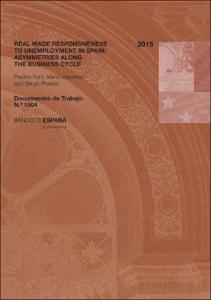Real wage responsiveness to unemployment in Spain : asymmetries along the business cycle
Autor
Fecha de publicación
19-feb-2015
Descripción física
22 p. : gráf., tab., fórmulas
Resumen
En este trabajo se estima la sensibilidad cíclica de los salarios en España entre 1987 y 2013 a partir de los datos proporcionados por la Muestra Continua de Vidas Laborales (MCVL). La ciclicidad de los salarios en el mercado de trabajo español es reducida, encontrándose, además, que esta ciclicidad es aún más baja en las épocas de recesión. Por otro lado, no se encuentra que niveles más elevados de desempleo provoquen un mayor descenso salarial en los períodos de recesión, mientras que una menor tasa de paro tiende a incrementar los aumentos salariales en épocas expansivas. Estos resultados a nivel agregado se mantienen cuando se analizan las posibles diferencias en la ciclicidad de los salarios en función de la antigüedad en el empleo, el tipo de contrato y la edad de los trabajadores. No obstante, los salarios de los entrantes al mercado, con menos de un año en el empleo, muestran la mayor sensibilidad a las condiciones cíclicas de la economía y el menor grado de asimetría entre las expansiones y las recesiones. Por el contrario, los salarios de los trabajadores con más de seis años de antigüedad en el empleo se caracterizan como los más protegidos frente a los ajustes salariales en las recesiones. Los resultados son similares cuando se analizan las diferencias entre trabajadores con contrato indefinido y aquellos con un contrato temporal y entre trabajadores jóvenes y trabajadores mayores
We estimate real wage cyclicality in the period between 1987 and 2013 using a large administrative dataset of workers in Spain. Real wages are weakly procyclical in Spain and, focusing on different phases of the business cycle, we find significant differences between expansions and recessions, with even lower real wage cyclicality in recessions. Furthermore, higher levels of unemployment do not translate into additional real wage adjustments when the economy is contracting, while lower levels of unemployment during expansions have incremental effects on wage elasticity. This general result holds after accounting for differences in tenure, type of contract and age. Nevertheless, wages of newly hired workers are the most sensitive to the business cycle and exhibit the lowest asymmetric pattern between expansions and recessions. At the other end of the scale, wages of workers with more than six years’ tenure provide the most protection against economic downturns. The same is true for fixed-term vs. permanent workers and for young vs. older workers
We estimate real wage cyclicality in the period between 1987 and 2013 using a large administrative dataset of workers in Spain. Real wages are weakly procyclical in Spain and, focusing on different phases of the business cycle, we find significant differences between expansions and recessions, with even lower real wage cyclicality in recessions. Furthermore, higher levels of unemployment do not translate into additional real wage adjustments when the economy is contracting, while lower levels of unemployment during expansions have incremental effects on wage elasticity. This general result holds after accounting for differences in tenure, type of contract and age. Nevertheless, wages of newly hired workers are the most sensitive to the business cycle and exhibit the lowest asymmetric pattern between expansions and recessions. At the other end of the scale, wages of workers with more than six years’ tenure provide the most protection against economic downturns. The same is true for fixed-term vs. permanent workers and for young vs. older workers
Publicado en
Documentos de Trabajo / Banco de España, 1504
Materias
Ciclicidad salarial; Rigideces salariales a la baja; Registros administrativos de Seguridad Social; Wage cyclicality; Downward wage rigidity; Social security data; Instituciones financieras no bancarias; Fluctuaciones y ciclos económicos; España
Aparece en las colecciones:












